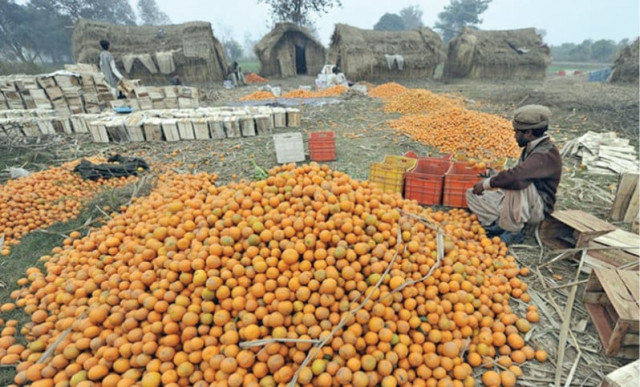Kinnow exports projected to decline by 50%
PFVA urges govt to declare agricultural emergency, develop new varieties

The Kinnow industry is on the verge of collapse, with a projected 50% decline in exports and the closure of 50% of processing plants, warn leading exporters. Sharing a plethora of reasons with The Express Tribune, they highlight issues such as a shorter shelf life for Kinnow, lack of resistance to diseases, low-quality yield, seeds in the fruit, dull shell colour, bumper citrus crops in regional countries, hefty export taxes to Afghanistan, delayed import quotas from Indonesia’s government, and other challenges. The only saving grace, exporters note, is the superior taste of Kinnow.
Waheed Ahmed, Patron–in–Chief of All Pakistan Fruit and Vegetable Exporters Association (PFVA), expressed concern about the falling export of Kinnow and urges the government to declare an agricultural emergency, develop new varieties promptly, and leverage the experiences of foreign countries to introduce disease-free varieties capable of coping with climate change effects.
“A few years ago, Pakistan earned $220 million from the export of 450,000 tonnes of Kinnow. However, this year, the export of high-quality Kinnow is expected to fall to 150,000 to 275,000 tonnes, yielding hardly $100 million. If new varieties are introduced and cultivated, the export of citrus fruits could be enhanced to $3 million, gradually reaching up to $1 billion within 10 years,” he suggests.
He pointed out that the current variety of Mandarin (Kinnow) imported by the USA was introduced in Pakistan 60 years ago and has lost its natural resistance against diseases over time. Climate change has further weakened the variety.
“Usually, any fruit variety reaches its maturity in 25 years, after which modern varieties to replace the old variety are introduced. New varieties have not yet been developed! Kinnow orchards are an abode of diseases, and the appearance of the Kinnow has deteriorated due to the spots on its skin, making it unsuitable for export. The shelf life of Kinnow has also shrunk to around 20 days instead of two months. The export consignments are falling prey to deterioration, causing huge financial losses to both growers-cum-exporters and importers,” he explains.
Despite numerous appeals to the Punjab government, the Ministry of National Food Security and Research (MNFSR), and agricultural research institutions to address the issues, the Kinnow industry, which generates millions of US dollars and provides 400,000 jobs, is on the verge of collapse. Ahmed warns that if the problems are not addressed, the export of the fruit could come to a complete halt in the next two years. Almost 50% of the 200 Kinnow processing plants have been closed since the commencement of the Kinnow season.
Read Cultivation of seedless oranges advised
Former president of Sargodha Chamber of Commerce and Industry (SCCI), Shoaib Ahmed Basra, a leading exporter and progressive grower, explained the challenges posed by regional competitors such as China, Turkey, Morocco, Egypt, and Iran, which have bumper citrus crops. He noted that Pakistan also has a bumper crop of 2.7 million tonnes this year, a significant increase from 1.5 million tonnes last year. However, the export trend indicates less than 50% exports this year. The fruit is being exported to UAE, Saudi Arabia, and Oman by shipping companies and to Kazakhstan, Tajikistan, and Uzbekistan by roads.
He highlighted additional challenges, including high export taxes to Afghanistan, delayed import quotas from Indonesia, and logistical issues related to sea trade. He said an exporter has to pay Rs3 million in terms of tax on a single trailer carrying 35 tonnes over export to Afghanistan this year, and only 150 containers carrying 400 tonnes of Kinnow were exported to Indonesia so far in comparison with 800 containers carrying 20,000 tonnes last year.
He urged the government to engage in diplomatic talks with Indonesia’s government to release import quotas for Pakistani’s Kinnow, reduce export tax to Afghanistan, and, above all, strengthen logistics to send cargo by roads to Russia, Belarus, Ukraine, and the like. Cargo by sea takes two months to reach these countries, while cargo by road could arrive in a fortnight’s time. He also calls for conducting research and growing a seedless Kinnow variety, which is more popular worldwide.
Published in The Express Tribune, January 2nd, 2024.
Like Business on Facebook, follow @TribuneBiz on Twitter to stay informed and join in the conversation.


















COMMENTS
Comments are moderated and generally will be posted if they are on-topic and not abusive.
For more information, please see our Comments FAQ